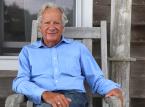Some people spend years of their lives not knowing they need glasses. When they finally get them, the improved clarity of vision is profound. They can see things they didn’t know were even possible to see. The world opens up. According to Dr. Elliott Dacher, meditation can have the same effect.
Mr. Dacher is a medical doctor who many years ago turned to meditation to focus on a more holistic approach to health and well-being. For many years he has led meditation courses at the Martha’s Vineyard Hospital. These eight-week sessions, meeting once a week, have reached over 500 people over the years.
This fall, for the first time, Mr. Dacher will offer a week-long intensive retreat from October 22 to 28. Each day will consist of two-hour classes each morning and evening, along with other events to encourage dialogue.
From his home on the top of a hill in Chilmark, Mr. Dacher described the benefits he’s seen in this type of concentrated study. He has visited India 12 times to practice and study amongst the Tibetan people, he said. His house is a testament to his travels, with art he picked up in India and other Asian countries hanging from every wall.
Mr. Dacher said his first visit to India sparked his interest in meditation. Since then, he’s returned nearly every year. “I got the chance to meet some pretty wise teachers, the Dalai Lama being one of them,” he said. And he’s been able to bring much of what he’s learned back home.
These days, many people are familiar with meditation in some form. Some meditate for a few minutes while lying supine in savasana, while others take a meditation class here and there or sit and breathe along with a smartphone app. But the way it’s presented to Americans is not the whole story, Mr. Dacher said.
“The purpose of meditation is not relaxation,” he said. “It’s really about the ability to access the more spiritual, soulful and basic selfness of our being.”
Mr. Dacher wants to bridge the gap between how many Americans think of meditation and the history of the practice and its larger aims. He teaches his courses in a secular way, which has attracted a wide variety of participants.
“There are so many different types of people that come into the course,” he said. “There are people who come with physical ailments. Other people come in because their lives are too stressed, their minds are too busy.”
And then there are people who come in for more subtle reasons. “They simply feel there is more to life and they want to change their life so they have a richer experience,” Mr. Dacher said.
With a combination of lessons and practice, participants learn to see their thoughts — and their feelings about those thoughts — as separate from who they are at the core of their being. They learn that their personality is not who they are either, said Mr. Dacher. And regardless of what ailment or issue they came with, after a few sessions, things start to change.
“Within two to three weeks, universally you hear that people are less reactive,” Mr. Dacher said.
And this means that when difficulties emerge, as they continue to do, people find they aren’t responding to them in the same way. People who come in with chronic pain say they don’t feel it like they used to.
“It’s not that the pain stops,” Mr. Dacher said, “It’s that they are able to relate to the pain in such a different way.”
And when the chronic pain is more of the mental variety, Mr. Dacher has also seen that relief first hand. “If it’s someone with an overactive mind, they find that they don’t have to go outside and organize the world anymore.”
Then comes the calm. When you don’t have to react to every thought or feeling, there’s more space for stillness, he said.
Then comes the insights. When people finally put on their new glasses, they can see birds in the trees where before there was just a smudge.
“They have found the place inside them that is naturally peaceful, naturally content,” said Mr. Dacher.
Of course, acknowledging this potential is one thing. Learning how to continually tap into it is a lifelong process. The week-long course will offer participants a chance to begin.
“The intensive retreat unhooks one from all of the other stimuli for a period,” said Mr. Dacher.
So forget about your lists and alarms for a week. But re-entry into society after the course is also a challenge.
“The rest of the world creeps quickly back in,” he said. “You have to follow it up.”
Mr. Dacher has prepared for this. Participants will leave the experience with his meditation guide book and a practice CD. They will also have the opportunity to continue to practice and connect with other students online.
“Like any other learning, this is a process of ongoing study, reflection and practice,” Mr. Dacher said. “It’s a lifetime undertaking to live in a different way.”
More information can be found at centerforhumanflourishing.org.





Comments
Comment policy »